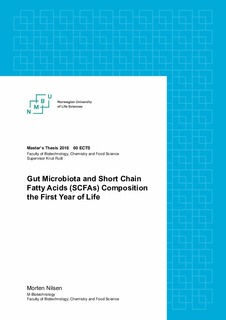| dc.contributor.advisor | Rudi, Knut | |
| dc.contributor.author | Nilsen, Morten | |
| dc.date.accessioned | 2018-09-10T08:43:53Z | |
| dc.date.available | 2018-09-10T08:43:53Z | |
| dc.date.issued | 2018 | |
| dc.identifier.uri | http://hdl.handle.net/11250/2561652 | |
| dc.description.abstract | The mutualistic relationship between humans and our gut microbiota is essential in immune development. The microbial colonization of the human GI tract starts prenatal and continues with facultative and strict anaerobes as we age, due to gut environmental changes and diet. The bacteria in the gut microbiota utilize indigestible sugars and synthesize health-beneficial substrates, such as the short chain fatty acids (SCFAs). SCFAs are organic acids which act as a link between the gut microbiota and the maturation of our immune system. To investigate SCFAs’ effect on our health, analysis of aging children might be key to prevent immunological disorders developing early life. Therefore, the aim of this study was to determine the microbial composition, short chain fatty acids composition and how these correlates in children their first year of life.
Fecal samples from 100 mothers and their children were received from the cohort study Prevent Atopic Dermatitis and Allergies (PreventADALL). The longitudinal sampling of children represented newborns, 3 months, 6 months and 12 months of age. The gut microbiota composition was determined by sequencing, while SCFAs composition was detected by gas chromatography.
The majority of the microbial composition as the children aged corresponded with earlier studies. The SCFAs composition changed significantly as the child aged in correlation with the microbial shifts observed. Both microbial and SCFAs composition of the children increased in similarity to their mothers as they aged. Clostridium represented 66% of the gut microbiota at the age of 12-months with a positive correlation to butyrate. The increased proportion of propionate in the same age group was positively correlated to Bacteroidales. These positive correlations strengthen recent knowledge of these bacteria being important SCFA producers in the gut microbiota. Between 6 and 12 months, the shift from an infant- to an adult-like gut microbiota and SCFAs composition might be initiated and influenced by weaning and introduction to solid foods. In conclusion, this work lays the foundation for further research investigating the immunological effects of SCFAs. | nb_NO |
| dc.description.abstract | Det mutualistiske forholdet mellom mennesker og vår tarmmikrobiota er essensielt for immunutvikling. Den mikrobielle koloniseringen av menneskets mage-tarmkanal starter prenatal og fortsetter med fakultative og strikt anaerober som et resultat av forandringer i tarmmiljøet og diett. Bakteriene i tarmmikrobiotaen bryter ned ufordøyde sukkermolekyler og syntetiserer helsefremmende substrater, som kortkjedete fettsyrer. Kortkjedete fettsyrer er organiske syrer som virker som et bindeledd mellom tarmmikrobiotaen og utviklingen av vårt eget immunforsvar. For å videre undersøke kortkjedete fettsyrers effekt på vår helse, kan analyser av barn under oppvekst være en nøkkel for å forhindre utvikling av autoimmune sykdommer tidlig i livet. Målet for denne studien er å analysere den mikrobielle sammensetningen, kortkjedete fettsyre sammensetningen og hvordan disse korrelerer i barn under oppvekst.
Avføringsprøver fra 100 mødre og deres barn ble mottatt fra kohort studien Prevent Atopic Dermatitis and Allergies (PreventADALL). Den langsgående prøvetakingen av barn representerte nyfødte, 3 måneder, 6 måneder og 12 måneder gamle. Tarmmikrobiota sammensetningen ble fastslått ved hjelp av sekvensering, mens den kortkjedete fettsyresammensetningen ble funnet ved hjelp av gass kromatografi.
Majoriteten av den mikrobielle sammensetningen under oppvekst korresponderte med tidligere studier. Den kortkjedete fettsyre profilen viste signifikante forandringer i korrelasjon med de mikrobielle skiftene observert. Både mikrobiell og kortkjedet fettsyre sammensetning av barna økte i likhet til deres mødre under oppveksten. Clostridium representerte 66% av tarmmikrobiotaen til barna når de var 12-måneder gamle og var positivt korrelert til butyrat. Den økte proporsjonen av propionat i 12 måneders gruppen var positivt korrelert til Bacteroidales. Disse positive korrelasjonene styrker nylig kunnskap om at disse bakteriene er viktige kortkjedete fettsyre produsenter i tarmmikrobiotaen. Mellom 6 og 12 måneder kan forandringen fra barne- til voksenliknende mikrobiota og kortkjedete fettsyre sammensetning bli initiert og påvirket av brystmelk avvenning og introduksjon til fast føde. Dette arbeidet legger til grunne for videre forskning for å bedre forstå de kortkjedete fettsyrenes immunologiske effekt under barnets oppvekst. | nb_NO |
| dc.language.iso | eng | nb_NO |
| dc.publisher | Norwegian University of Life Sciences, Ås | nb_NO |
| dc.rights | Attribution-NonCommercial-NoDerivatives 4.0 Internasjonal | * |
| dc.rights.uri | http://creativecommons.org/licenses/by-nc-nd/4.0/deed.no | * |
| dc.subject | SCFA | nb_NO |
| dc.subject | Infant Development | nb_NO |
| dc.title | Gut microbiota and short chain fatty acids (SCFAs) composition the first year of life | nb_NO |
| dc.type | Master thesis | nb_NO |
| dc.description.version | submittedVersion | nb_NO |
| dc.subject.nsi | VDP::Matematikk og Naturvitenskap: 400::Basale biofag: 470::Generell mikrobiologi: 472 | nb_NO |
| dc.source.pagenumber | 74 | nb_NO |
| dc.description.localcode | M-BIOTEK | nb_NO |

